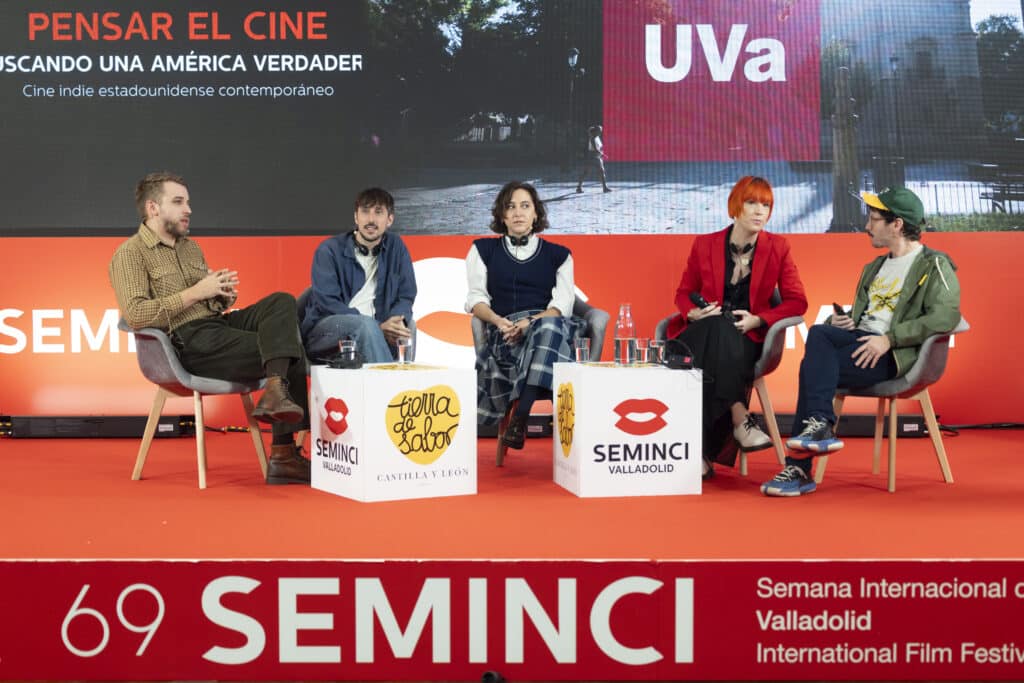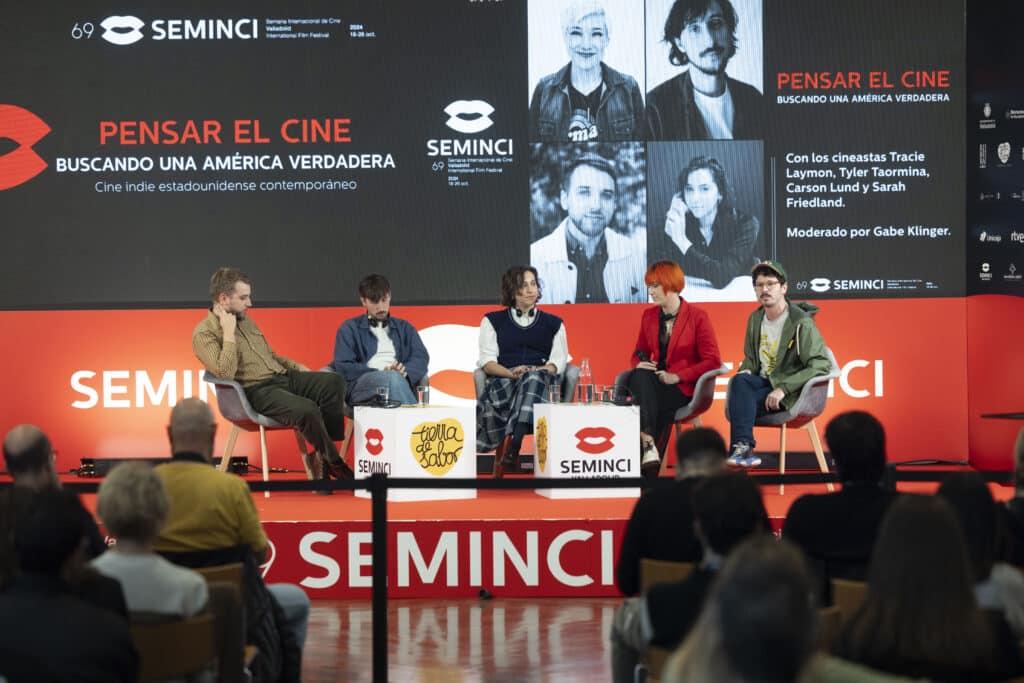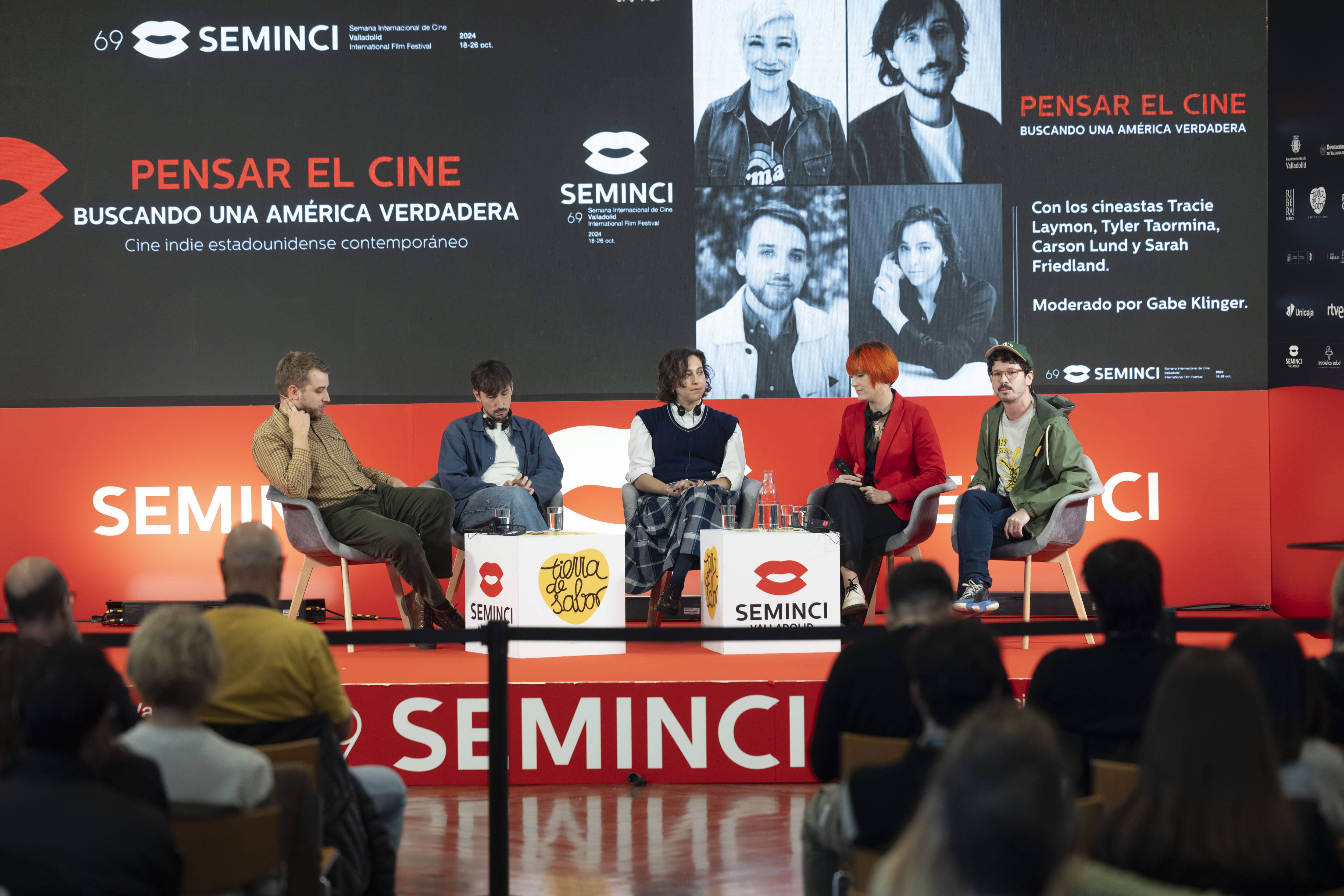- The American directors Sarah Friedland, Tracie Laymon, Carson Lund and Tyler Taormina, who are presenting their latest works at SEMINCI, took part in a conversation entitled ‘Searching for a real America’.
- They have vindicated a cinema to which they all belong, located on the margins and far from the dynamics of Hollywood, which portrays the America of the suburbs and the workers that is not often represented in big-budget cinema.

Valladolid, 21 October 2024. This 69th edition of the Valladolid International Film Festival (SEMINCI) is increasing its commitment to new independent American cinema, both in its competitive sections and through the retrospective dedicated to Nathan Silver. Among the activities included in ‘Thinking Cinema’, four of the filmmakers who have come to Valladolid to present their films, Sarah Friedland (Familiar Touch), Tracie Laymon (Bob Trevino Likes It), Tyler Taormina, (Christmas Eve in Miller’s Point) and Carson Lund (Eephus) have shared their points of view and experiences at a round table entitled ‘Searching for a real America. Contemporary American indie cinema’, moderated by the Brazilian director Gabe Klinger, has vindicated a type of cinema, situated on the margins of Hollywood, that reflects the lives of real people.
To understand what independent filmmaking means in the United States, it is necessary to distinguish between the usual funding model in Europe, where public money is often involved, and what we experience in the United States, where funding is usually provided by private individuals and companies. Tyler Taormina has therefore acknowledged his disenchantment with the Hollywood production model: ‘After the release of my first film, I found myself in a position where I was working with Hollywood producers who had made all these great films, but the promised money was disappearing at the end of the day. I realised that’s what they do; they waste your life and your time. It got to a point where I thought, if we make a film with them, I don’t think I’m going to feel very good about it’.
A feeling shared by Carson Lund, who also worked as cinematographer for Taormina on Christmas Eve in Miller’s Point: ‘’Actually, if you’re thinking about what we all have in common, it’s the constant struggle against the industrial machinery that we’re forced to maintain‘’.

Reflecting a real America in film
The four filmmakers have reflected on the situation of the kind of American cinema to which they all belong, situated on the margins and far from the dynamics of Hollywood, with an emphasis on portraying a real America, that of the suburbs, the working people and those stories that are not often represented in big-budget cinema. Sarah Friedland, who has made the film Familiar Touch from her own experience as a caregiver for elderly people with dementia, said: ‘I found the daily lives of the residents I worked with very distant from how ageing is portrayed in cinema, at least in American cinema. I think there are some really wonderful films about ageing outside the US, but I have yet to see an American film that I really love about an elderly character.
Commenting on this, Tracie Laymon said: ‘I think a lot of films I like are quite dark and I feel like we’re in a sad time in America, so I needed to do something honest and something that connects us rather than divides us. Bob Trevino Likes It is dedicated to a friend of mine who passed away, and I think having heart in filmmaking is a must’.
In parallel, Carson Lund has reflected on the relationship between film and baseball, and how both seem like elements of American culture from the past that have been written off as dead on several occasions: ‘When I moved to Los Angeles to study film I stopped playing baseball, but a few years later I joined an amateur league for adults. And I realised that when you play as an adult there isn’t this competitive pressure, it’s more about sharing time with like-minded people who have the same passion for something, and that’s what I wanted to portray in my film Eephus’. On the political position of portraying Americans’ time, he added: ‘I think baseball, specifically more than any other major sport in America, can be a kind of refuge from the stress of making a living in America’.
The four also agree on the way they work with the cast, trying to create a group and relationships that go beyond the film. Sarah Friedland organised workshops with the elders beforehand to explain to them how filming works, something that allowed them to become deeply integrated into the project. Tracie Layman, for her part, has referred to her process of working with the crew in the same way, as a kind of small family. Similarly, Carson Lund called all the participants in his film together before shooting so that they could spend a few days together and create real bonds that would be reflected in the film. In conceiving his film, Tyler Taormina has also ensured that it could not be about a single character, but had to give importance to the group, in a more collective way.
In addition to the aforementioned titles, the films Blue Sun Palace, by Constance Tsang and A Real Pain, by Jesse Eisenberg, will be screened at this year’s SEMINCI in the Punto de Encuentro section, as well as Invention, by Courtney Stephens, in Alquimias.
Press contact:
983 42 64 60
prensa@seminci.com



























![Logo Foro Cultural de Austria Madrid[1]](https://www.seminci.com/wp-content/uploads/2024/09/Logo-Foro-Cultural-de-Austria-Madrid1-300x76.jpg)








